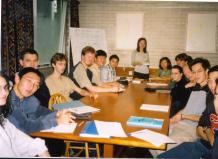Back to Silas S. Brown's home page
Old CUCCS (CUCUS) website

(I originally ran a multi-format server for them using Apache Cocoon 1.5 on a Debian 2 GNU/Linux PC in my room at St John's; I've now simplified it into a single page. The logo had slightly too much space between the "n" and the "e" because I forgot to fix TeX's kerning when I captioned it. They also had a private chat forum on my server which the committee moderated, plus I archived the emails. It was registered as "Chinese Cultural Society" in line with older clubs' use of adjectives in their names, but I'd been publishing for the Computer Society and wasn't averse to attributive nouns.)
1998--2000 committees
[The society was set up as CUCEC in about November 1998, with my new Computer Science classmate Lucy Lian playing a leading role---unfortunately I didn't keep a definitive list of who the others were. We gave it a website in 1999 when the second committee was established: ] President: Helen Zhang, New Hall [now renamed Murray Edwards
President: Helen Zhang, New Hall [now renamed Murray Edwards College---SSB ]Lucy writes: Having Helen as a friend, is like having found oneself; having her as the president of our CCS, in the same way, is like having found what the whole meaning of the society is. The one thing that shone through Helen is her pure zeal and her earnestness in all she said or did. There were times when difficulties crop up, clues were lost as to ``what's the next step'', ``how do we keep it up'' etc., and we started to wonder what the point of all the mountain of work is about. But with Helen there, Despondence never settles in. With her fiery character, the most important quality in any president or leader, she instills life---and sparks---into the running of the society.

Vice-President: Lucy Lian, New HallHiya, you may know me as the one who sends out annoying e-mails to clog up your inboxes?! Well last year I was your computing officer. This year I will also be organising the Mandarin and Cantonese classes (and teaching in the former most of the time) and all other forthcoming events. I will make sure that as many people hear about the society as possible, will be your first point of contact, and will fight (on your behalf) against Helen in every decision we make :-) You are all very welcome to come to the classes; being proficient in another language is useful and rewarding in more ways than one. You don't need to know everything about Chinese culture (I myself left China nearly a decade ago), and you don't have to be a linguist (being a Shakespeare fan doesn't make me one). All you need is interest and a determination that fluctuates less than the interest.
- Secretary: Jia Meng, New Hall
- Treasurer: Yo Yo Chan, New Hall
- Publicity Officer: Bao Qiang Xiao, St John's
- Complaints about this website should be sent to Silas S. Brown
Cantonese and Mandarin classes 1999/2000
Original website's front-page sentence:The Cambridge University Chinese Culture Society has the aim of making Chinese language and culture accessible to all who are interested.[The original constitution had a similar clause in its first section. The word "accessible" had been my suggestion, and yes I was thinking of the `disability' context, but also more generally---after all, my Web Access Gateway, although originally designed to help blind and partially-sighted people like myself, now also had a mode to let Chinese and Japanese students use those languages on Cambridge's older computers that didn't have the fonts---and my server was called `access' for both purposes---so there was a feeling of "we're in this together" and I didn't think anyone would object to putting that `A' word into CCS from the start.]
Classes introduction, written in 1999/2000:
These are classes run by Cambridge students, for other Cambridge students. The teachers are not paid. Classes cater for all levels of ability, and concentrate on useful everyday language rather than specialist terminology. They provide opportunity to learn/practise pronunciation, to practise reading, or writing. The classes should thus be suitable for complete beginners, for those who can speak but never learnt to read/write, or those who are already fluent in another dialect but want to be able to speak in Cantonese or Mandarin. Each class will cover a specific topic, to provide a structure to the learning. Dictionaries and audio resources will be available.[I often booked the St John's College Library Seminar Room for them, but there doesn't seem to be a picture of that. I think the picture above was taken in New Hall---SSB]Cantonese is the language used in Hong Kong and the Canton region of China, and to a lesser degree in Malaysia and Singapore. Mandarin is the national language of China, Taiwan, Singapore and Malaysia. Following the takeover of Hong Kong in 1997 and the takeover of Macau on December 20th 1999, Mandarin will become even more important as a world language.
Beginner Mandarin handouts
Handouts from 1999 (scanned images)
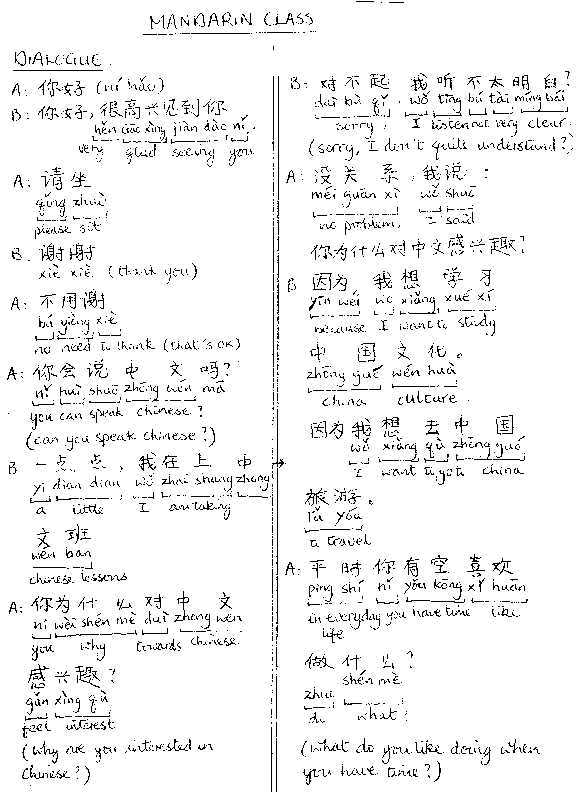
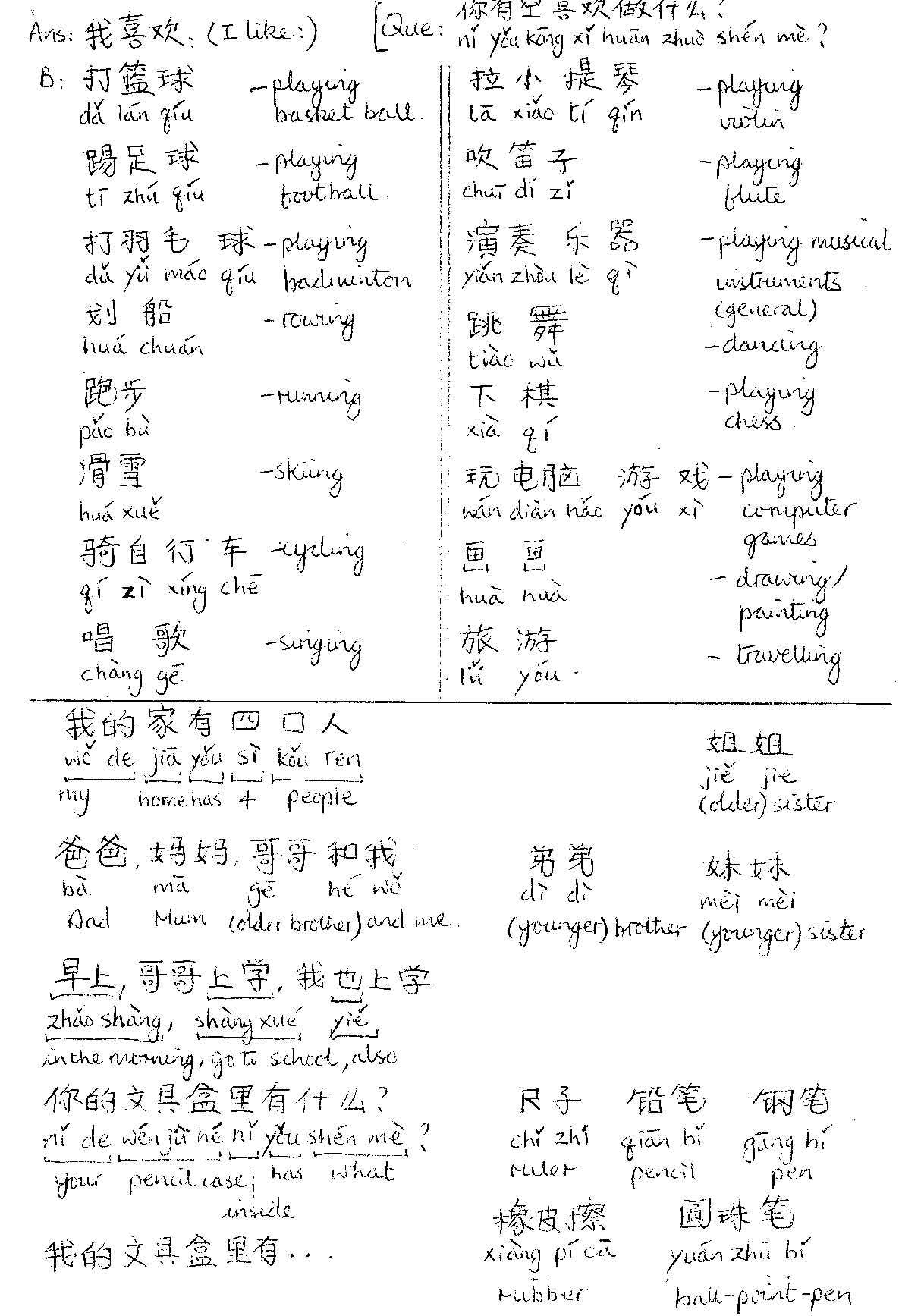
Handouts from April 2000 (scanned images)
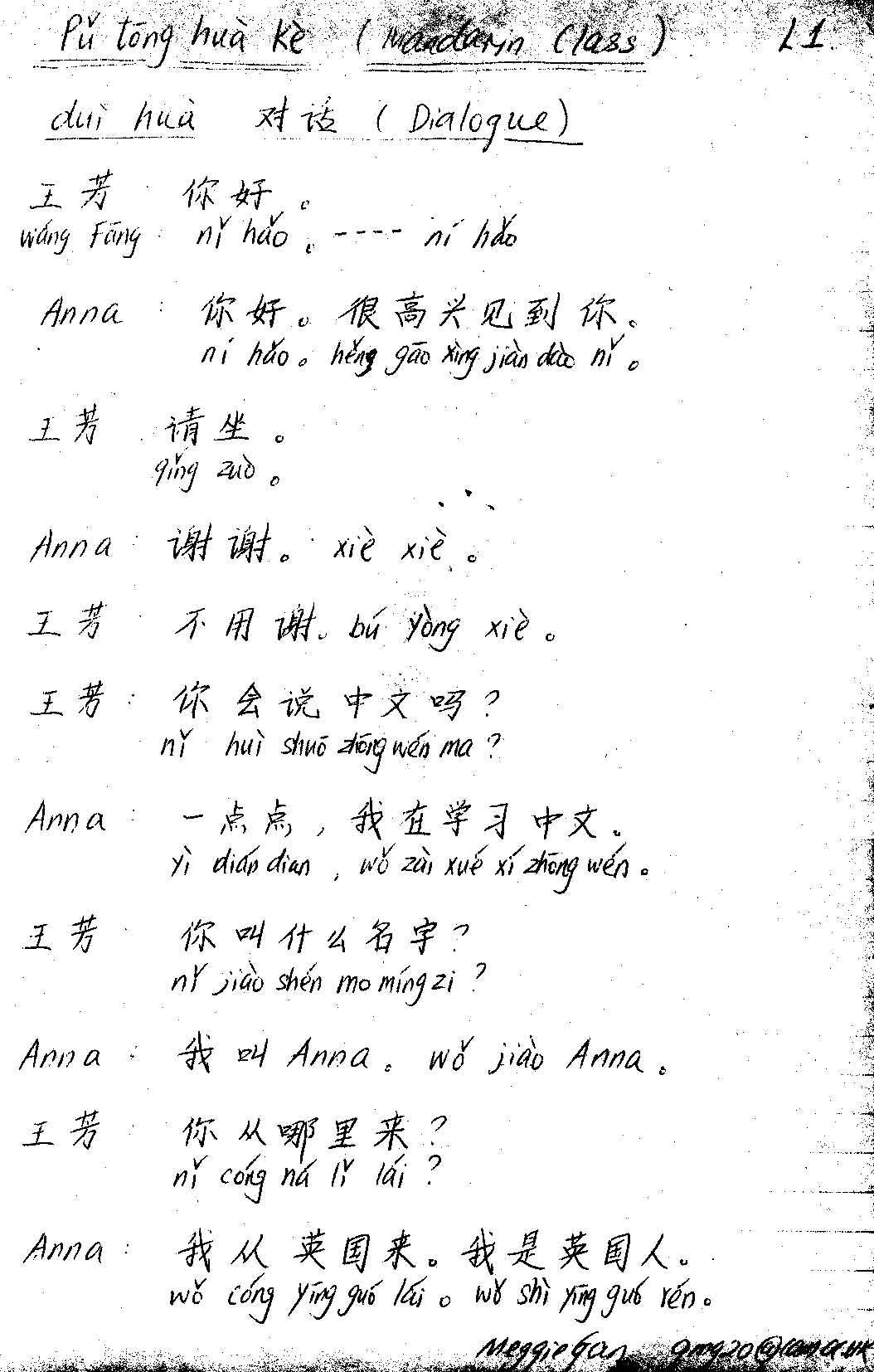
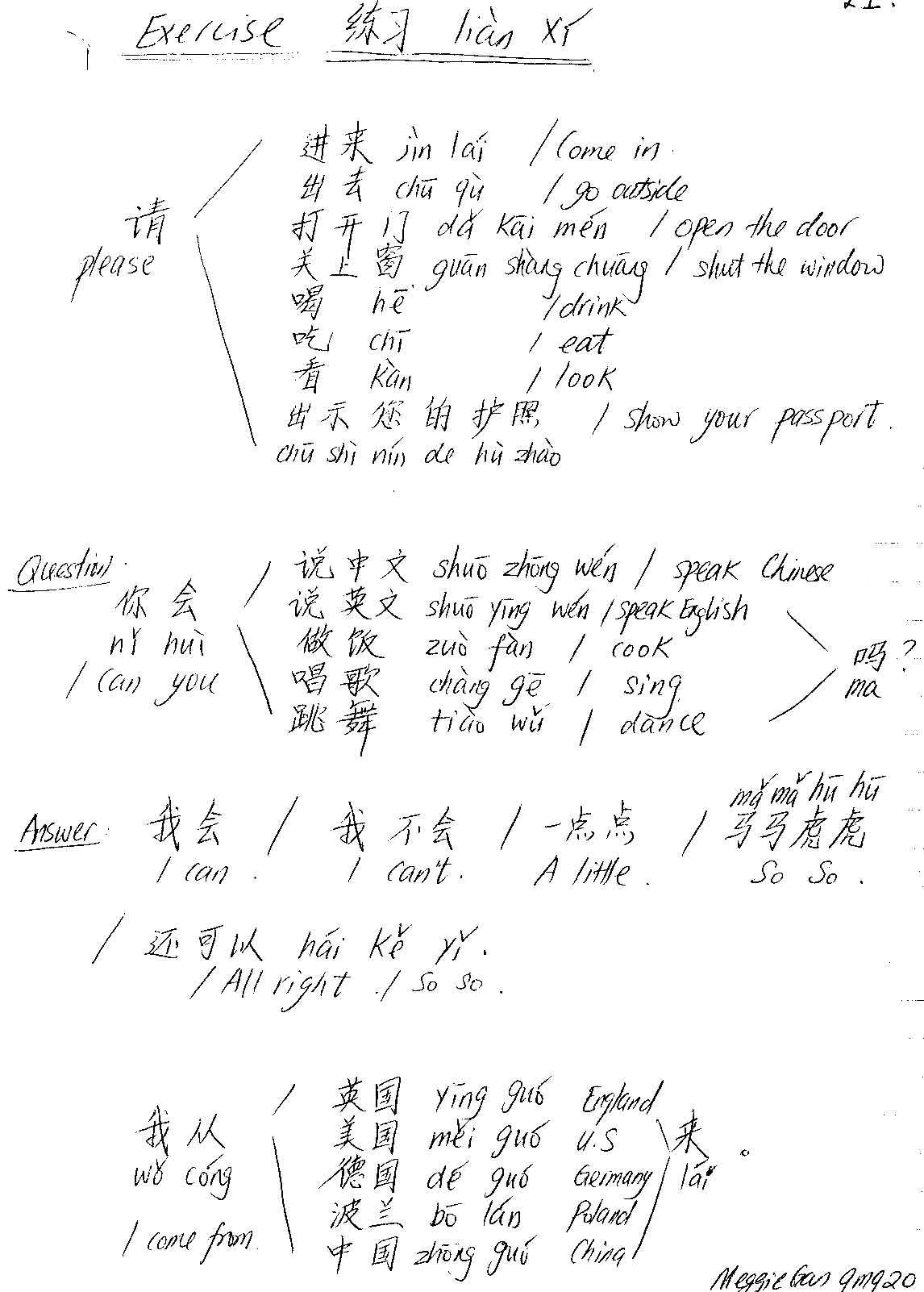
Cantonese handouts
1999-10-30 (scanned image)
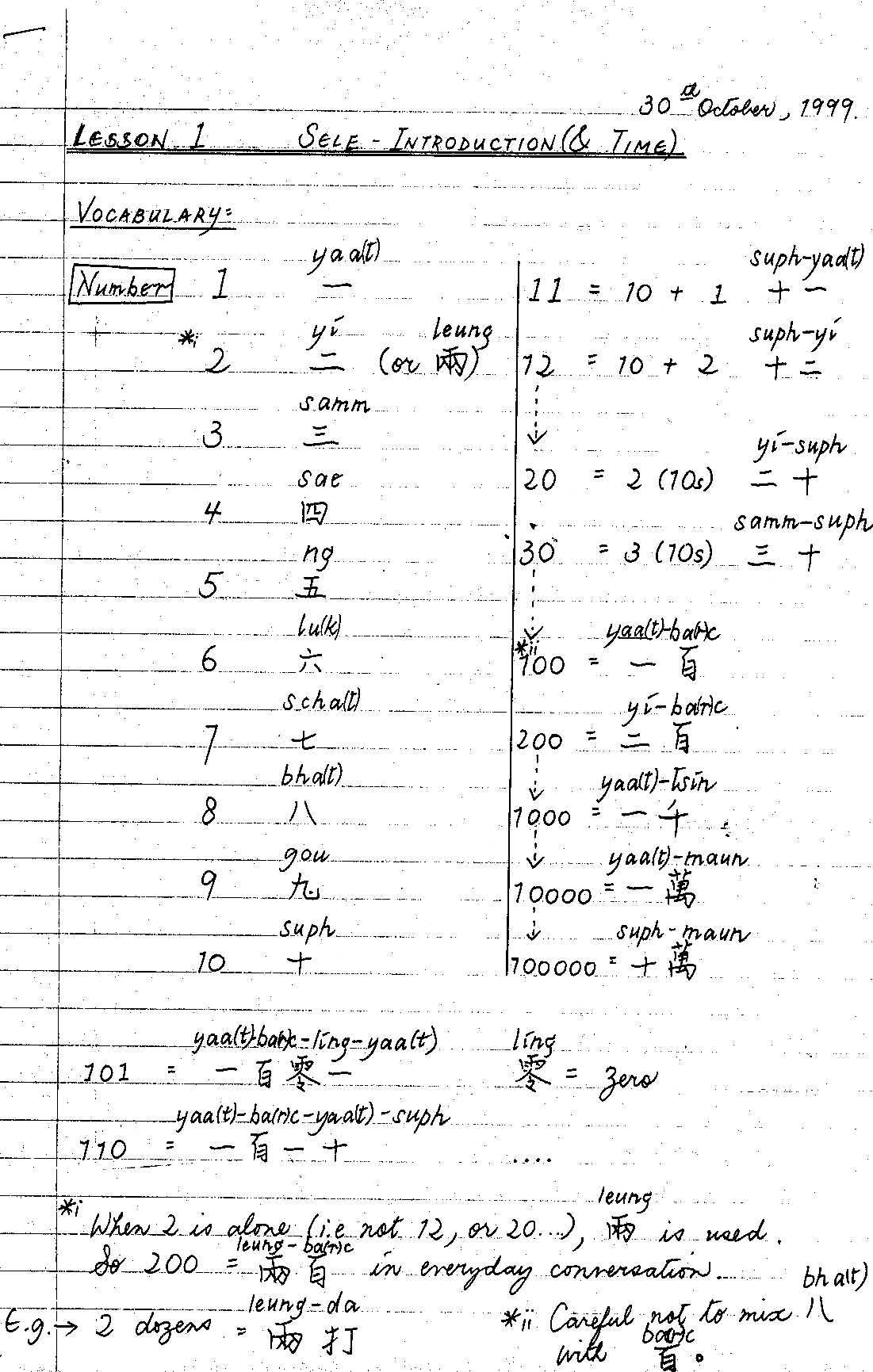
Cantonese, Lesson 2, 2001-02-04 by Li Zhong, Robinson college
| Cheung: |
老陳,呢位係我同事,李小姐。
老陳,這位是我的同事,李小姐。 Chan, this is my colleague, Ms. Li. |
| Chan: |
李小姐,你好。
李小姐,你好。 How do you do, Ms. Li? |
| Li: |
陳生,你好,叫我Kelly得啦。
陳先生,你好,叫我Kelly就可以了。 How do you do, Mr. Chan? You can call me Kelly. |
| Cheung: |
Kelly,老陳係我死黨離架。
Kelly,老陳係我老朋友來的。 Kelly, Chan is a very good friend of mine. (We've known each other for a long time.) |
| Chan: |
Kelly, 你有冇去過`香港戲院'?
Kelly,你有沒有去過‘香港電影院’? Have you been to `Hong Kong Cinema', Kelly? |
| Li: |
冇呀。
沒有啊。 No. |
| Cheung: |
我地一陣去啊,你去唔去?
我們一會兒去,你去嗎? We are going later, are you going as well? |
| Li: |
唔啦,我下晝要去行街。
不去了,下午我要去逛街。 No, I'm going shopping tonight. |
Notes
廣東話會把`先生'的先字省掉,如李生,黃生,張生。另在在朋輩或常當熟認的男性,我們也常以`老李' `老黃' `阿張' `阿陳' 的稱呼。
In Cantonese, the title `Mr' is `先生'. But when saying `Mr Li', we usually say `李生' instead of `李先生'.
上晝-上午,下晝-下午。
Morning, Afternoon.
Cantonese, Lesson 4, 2001-02-18
by Li Zhong, Robinson collegeConversation 1
|
陣間去邊食晏?
一會去那裏吃午飯? Where are you going for lunch (later)? |
|
我想去沙田食麵。
我想去沙田吃麵。 I want to go to Shatin have to some beef noodles. |
|
去(口個)間呀?好多人(口個)喎,要搵人早D去等位先得。
去那間嗎?很多人的,要先叫人去等位才行。 That one? There are (usually) lots of people there. You should ask someone to wait for the seats first. |
Conversation 2
|
聽晚去食自助餐定日本菜?
明晚去吃自助餐還是日本菜? (Shall we) have buffet or Japanese tomorrow night? |
| 食自助餐啦,上次食壽司食到我肚痛。
吃自助餐吧,上次吃壽司吃到我肚子痛。 Let us have buffet. Last time, I had stomach-ache after having sushi. |
| 邊個叫你食咁多喎。
誰叫你吃那么多。 Who asked you to eat so much? |
|
總之你以後食野小心D啦。聽晚你唔好食咁多沙律啦。
總之你以後吃東西小心點吧。你明晚不要吃太多沙律了。 Anyway, be careful when you eat next time. Don't eat too much salad tomorrow night. |
|
知啦。
知道了。 OK (I know). |
Note
注意 3) 第一個(口個)字和第二個是不同音的。In 3), the first `gor' and the second `gor' have different tones.
Committee established in February 2001
- President: Yuan (Chloe) Liu, New Hall
- Vice-President: Baoqiang Xiao, St John's
- Secretary: Yilin (Dillon) Zhang, King's
- Treasurer: Yuan Yuan (Amy) Zhang, New Hall
- Publicity Officer: Zheng (Jackie) Li, New Hall
- Information Director: Li (Ivan) Zhong, Robinson
- IT Consultant: Anna Zhao, Emmanuel
- Complaints about this website should be sent to Silas S. Brown
Cantonese and Mandarin handouts 2001/2002
Beginner Mandarin
The First Mandarin Lesson (2001-10-13)
Concise information of lesson 1:
- Brief Chinese language introduction
- Mandarin Pronunciation
- About tones
- Chinese characters from hieroglyph (2 at a time)
- Speaking and Listening Chinese --- most common social vocabulary and conversation
- Grammar --- summarized from the social conversation and about numerals and nouns
Lesson 2 handout
[Pages 2 to 6 of the Routledge book Chinese: An Essential Grammar, not reproduced here for copyright reasons. I do recommend that book though---SSB]Lessons 3 and 4 handout by Chloe Liu
What would you like to have?
May I ask how much the coffee is?
Three yuan.
Can I have one please
Please wait for a while.
Thanks.
Bye.
Scanned images of handouts for Lessons 5 to 7
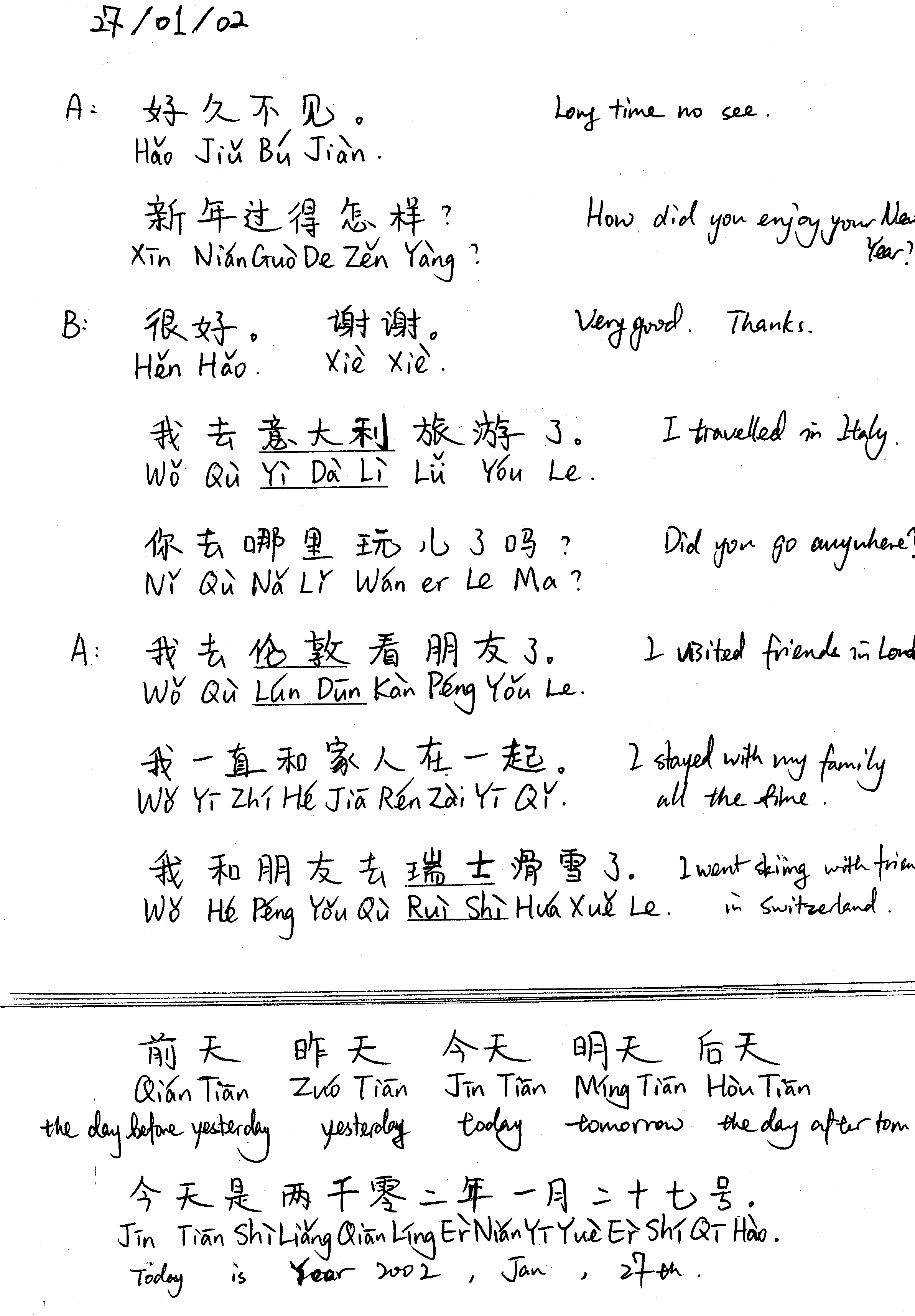
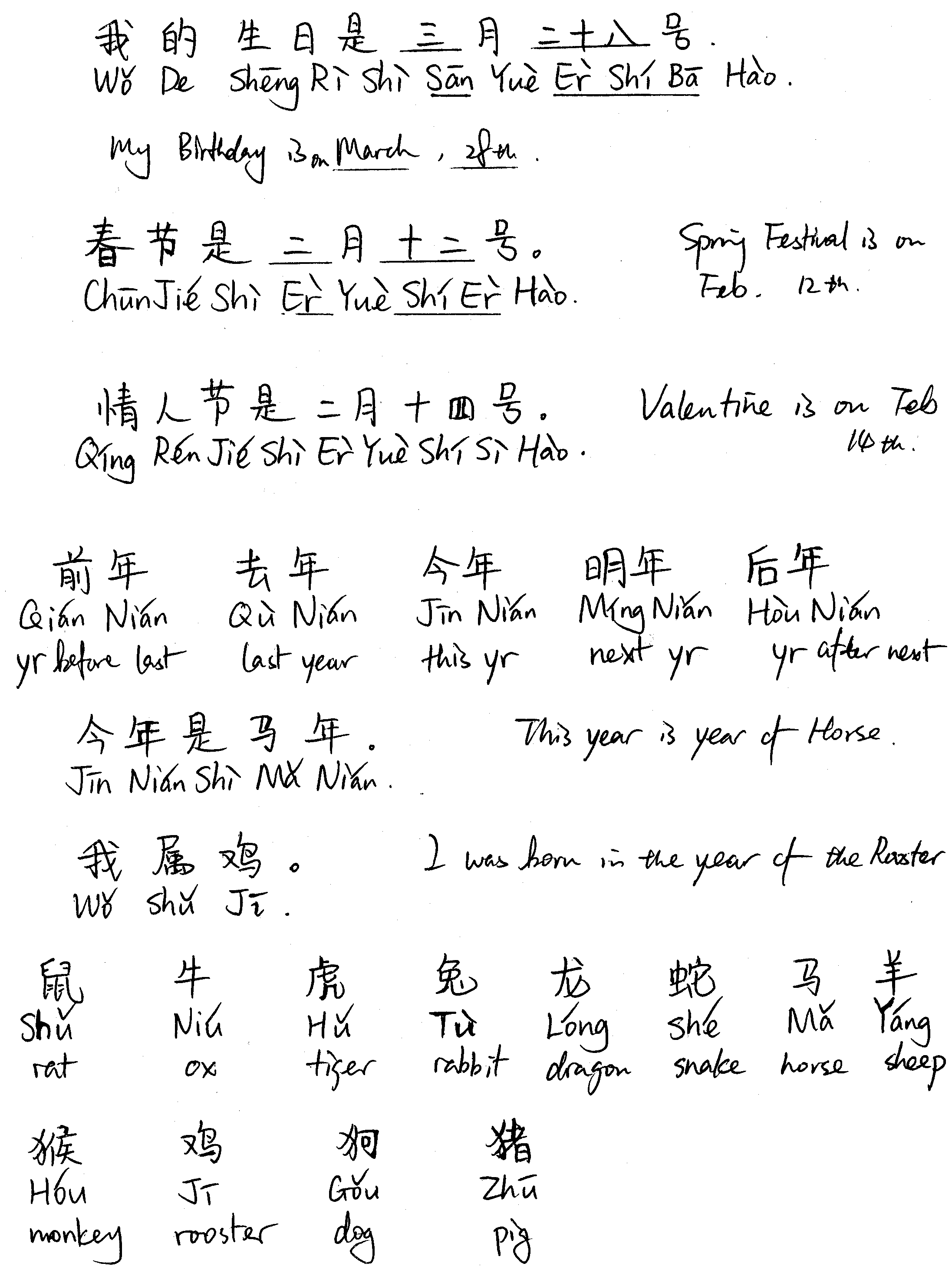
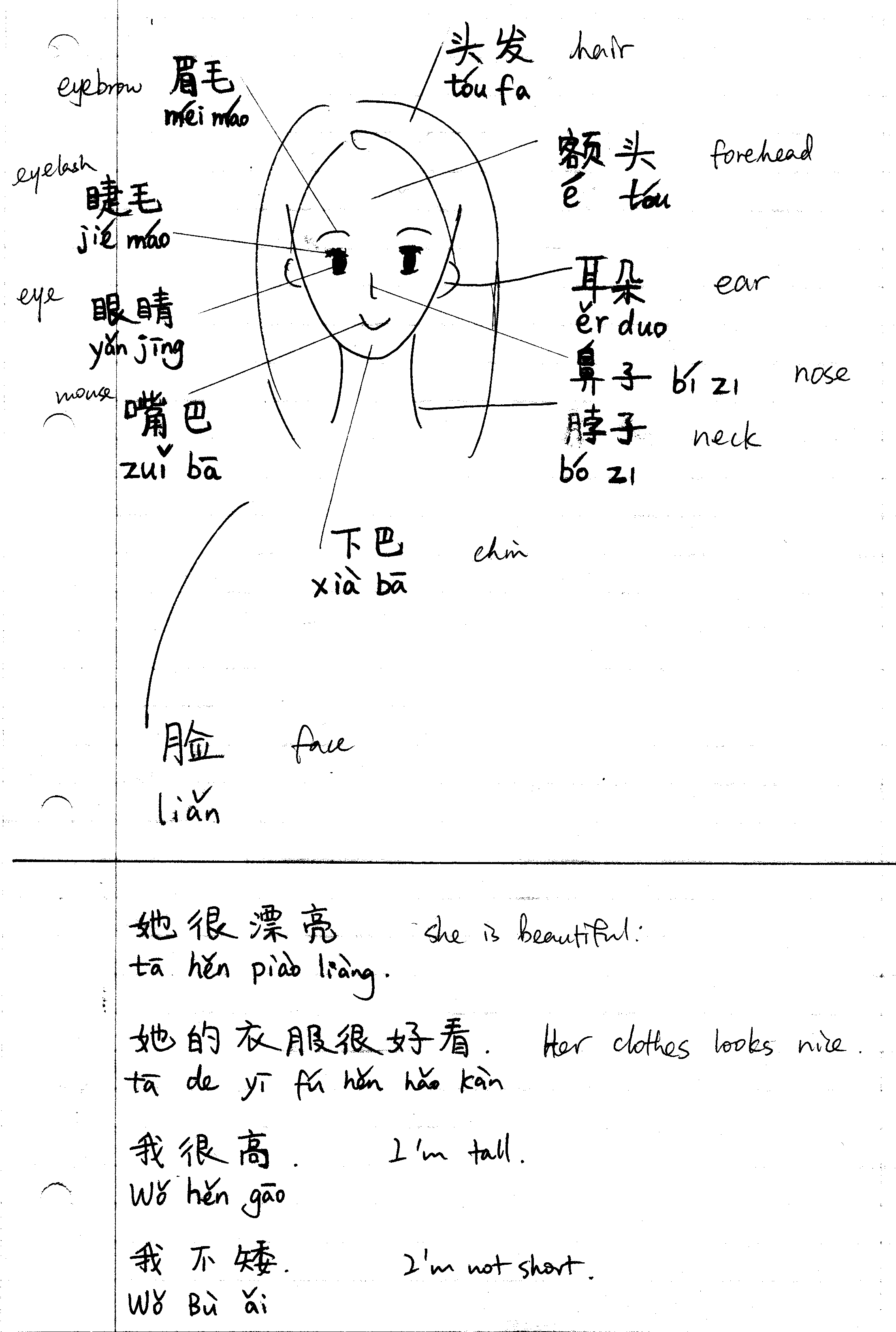
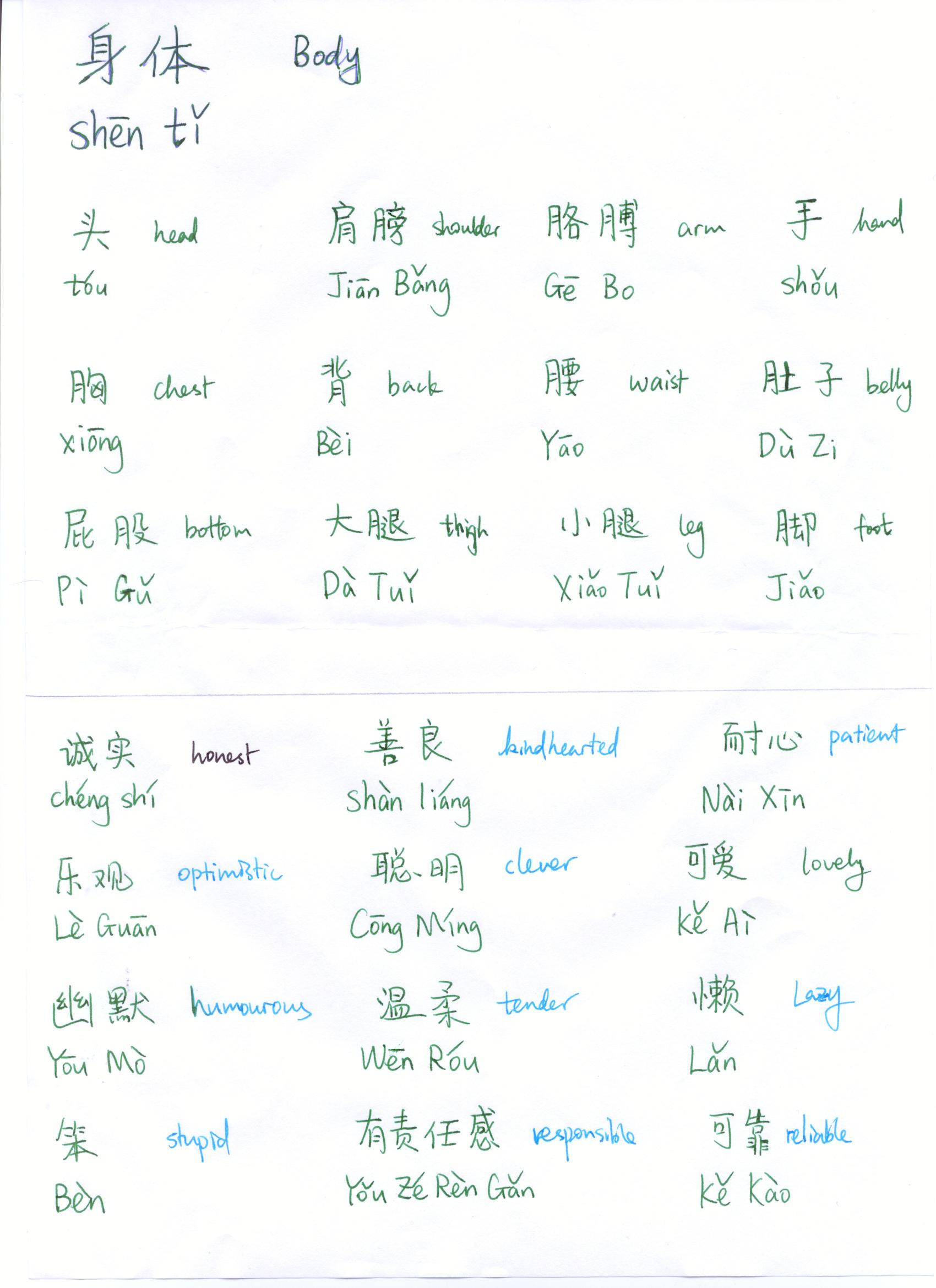
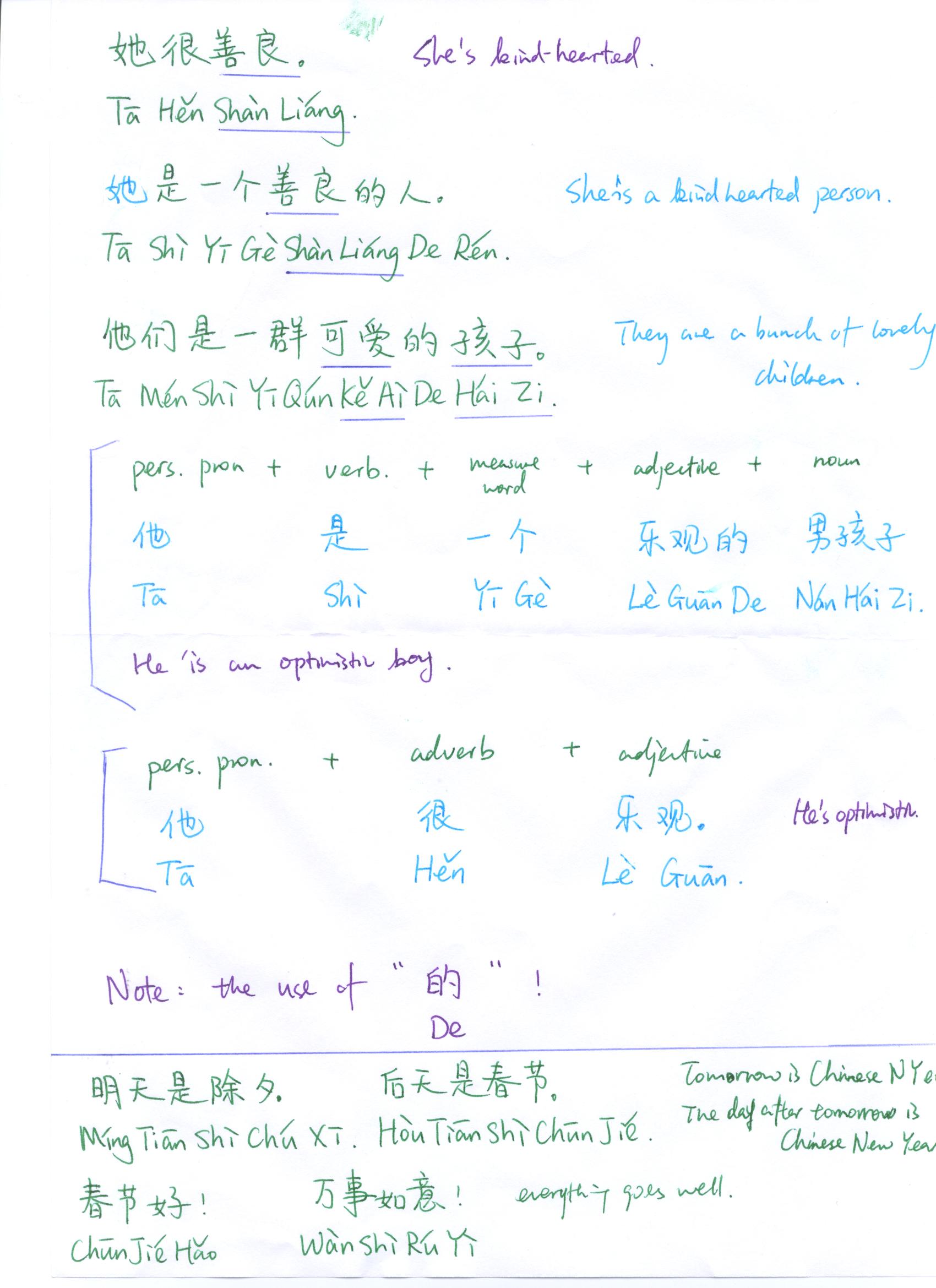
Intermediate Mandarin handouts 2002
Mandarin Intermediate Lesson 1 (2002-01-27)
日期: 2002年1月27日
大家新年好。今年已经是2002年了。你对今年有什么特别的打算吗?
- 我要。。努力提高我的中文水平。
- 我希望。。可以学会开车。
- 我准备。。在新的一年里多做一些体育活动。
- 很/非常/特别。。好
- 还可以
- 不是很好
- 我留在剑桥了。
- 我回家了。
- 我去了。。。
- 我去旅游了。
- 我。。。和我的家人在一起吃饭。
- 。。。去了一位朋友的新年聚会。
作者:小妙
鲨鱼看着一个滑浪风帆运动员说:“招待真周到!既有早餐,又有盘子和餐巾。”
都收到什么圣诞礼物了?
你都去了哪些地方?
我去了。。。
Mandarin Intermediate Lesson 3 (2002-02-10)
2002年2月10日我要先去做头发再去买点东西。
先去买。。。再去超市买一些吃的。。。
厨房用品:
盘子,刀子,叉子,勺子,筷子,杯子(玻璃杯,酒杯),碗,冰箱,烤箱,洗碗机,微波炉
洗手间用品:
牙膏,牙刷,脸霜,洗面奶,洗手液,浴巾,浴液,
吃的/食品:
苹果,香蕉,橙子,桔子,西瓜,芒果,桃子,李子,杏,梨
面包,牛奶,奶酪,鱼,鸡肉,羊肉,牛肉,猪肉,
菠菜,油菜,白菜,芹菜,萝卜,洋葱,
如果方便的话, 你可以帮我也买(一个)。。。吗
你最喜欢吃什么?
你最喜欢什么颜色?
红色,桔红色(橙),黄色,绿色,蓝色,青色,紫色,黑色,白色,棕色
桔子是桔红色的。
情人节快到了,教大家个成语:
一見鐘情
一見如故
Cantonese handouts
Cantonese, Lesson 1, 2001-10-14 by Li Zhong
What is Cantonese?
Cantonese is not the official dialect of China. Putonghua is. Literally translated, Putonghua means "the common dialect." It is meant to be the common dialect for the whole of China. According to statistics, about 73% of the population in China speaks Putonghua. Only about 5% speak Cantonese, but 5% already accounts for about 60 Million people.
Cantonese is a dialect spoken in Hong Kong, Macau, Guangzhou, the greater part of Guangdong Province, the southern part of Guangxi Province and some other parts in South East Asia. The number of ethnic Chinese resident outside China who speaks Cantonese is also a very important factor to consider when we assess the usefulness and popularity of Cantonese.
Frankly speaking, it is very difficult to learn Cantonese as there are totally nine tones in this dialect. (Note that some systems use 12 tones, and some use 6 tones.)
You should note that Cantonese is a dialect for speaking but not for writing. People speaking in Cantonese usually write in Chinese.
Tones are important!
With English, the tones can be interchanged without sounding funny. But with Cantonese, each word correlates with one tone and saying a word with the wrong tone is the most common problem with people learning Cantonese. One must apply the right pitch to each tone; otherwise, what is said may convey a totally different meaning.
Some Basic Cantonese to get started
The
following table is to give you a “taste” of the pronunciation of Cantonese as
well as the Chinese characters (in Traditional form). Notice that the system
the table is using is the 6-tone version used in the LSHK transcription scheme
(香港語言學學會注音方案)
[this is now known as "Jyutping"---SSB].
便啲啦。
When you want to pay the bill in the
restaurant, you may say…
買單啊,唔該。
When you want to ask how much the
piece of good is, you may say…
宜個幾錢啊? P.S. Of course if you are in Hong
Kong, you can also use English.
English
Written Chinese
Cantonese pronunciation
Hello.
你好。
Nei5 hou2
How are
you?
你好嗎?
Nei5 hou2
maa3
Good
morning.
早晨。
Zou2 san4
Good
night.
晚安。
Maan4 on1
Good bye.
再見。
Zoi3 gin3
Thank
you.
多謝。 Or 唔該。
Do1 ze6, Ng3 goi1
Sorry.
對唔住。
Deoi3 ng3
zyu6
Congratulations.
恭喜。
Gung1
hei2
Useful terms for tourists
When you bargain in a shop, you may
say…
(Cheaper please.)
(Check, please.)
(How much is this?)
Cantonese Lesson 2 (2001-10-21) by Benjamin Li
幾位呀? How many people?
兩位,唔該。 Two, please.
樓上定 樓下? Upstairs or here?
樓上,唔該。 Upstairs please.
(依度) ? Here (this table)?
好呀,唔該。 Sure, thanks.
飲什麼茶? What type of tea do you want?
菊花。 Chrysanthemum tea
if no one serves you
唔該,可唔可以比個menu我? Excuse me, can I have a menu plz.
等等la Wait a second.
唔該 …我想點菜 。 Excuse me, can I order now.
點菜未呀? Ready to order?
得la。 Ready.
未呀。 Not ready yet.
| 酸辣湯 | Hot & sour soup |
| 雞蓉(蜀)米湯 | Chicken and sweet corn soup |
| 蟹肉(蜀)米湯 | Crab and sweet corn soup |
| 白飯 | Steam rice |
| 叉燒飯 | Char sue with steam rice |
| 燒肉飯 | Roast port with steam rice |
| 燒鴨飯 | Roast duck with steam rice |
| 揚州炒飯 | Yung Chow Fired Rice |
| 乾炒牛河 | Fry beef with rice noodle |
| 上海炒麵 | Shang hai fried noodle |
| 星洲炒米 | Singapore fried noodle |
| 雲吞麵 | Dumping noodle |
埋單呀,唔該。 Can I have the bill please?
Read from the bill, then leave the restaurant.(oh remember to pay the bill, or hehehe)
Cantonese Lesson 3 (2001-10-28) by Benjamin Li
| 的士站 | taxi stand / rank |
| 巴士站 | bus stop |
| 火車站 | railway station |
| 地鐵站 | underground station |
| 飛機場 | airport |
| 碼頭 | port |
| 天橋 | bridge |
| 方向 | direction |
| 轉左 | Turn left |
| 轉右 | Turn right |
| 直行 | Go straight |
| 穿過 | Go through |
| 第一個路口 | The first crossroad |
| 第二個路口 | The second crossroad |
| 請問,的士站(係)邊度? | Excuse me, can u tell me where the taxi stand is? |
| 唔該,巴士站(係)邊度? | Excuse me, can u tell me where the bus stop is? |
| 唔該,最近 (gei) 地鐵站(係)邊度? | Excuse me, can u tell me where the nearest underground station is? |
| 直行,第一個路口轉左,跟住直行,穿過個天橋 , 轉左 | Go straight, turn left at the first crossroad, then go straight, after go through the bridge turn left. |
| 唔該,(E)(格) 巴士去唔去機場(ga)? | Excuse me, does this bus go to the airport? |
| 去 / 去(ga)。 | Yes. |
| 唔去呀,你去(搭) A56 la。 | No, but u can take A56. |
In a taxi
唔該,去機場要幾錢呀? Excuse me, how much is it to go to the airport.
去機場呀,唔該。 Take me to the airport plz.
Cantonese Lesson 4 (2001-11-04) by Benjamin Li
Time
請問,(yi) (家) 幾點? Excuse me, can u tell me what time is it?
| 1:00 | 一點 /一點鐘 |
| 2:05 | 兩點(踏) 一/ 兩點零五分 |
| 3:10 | 三點(踏) 二/ 三點十分 |
| 4:15 | 四點(踏) 三 |
| 5:20 | 五點(踏) 四 |
| 6:25 | 六點(踏) 五 |
| 7:30 | 七點半 |
| 8:35 | 八點(踏) 七 |
| 9:40 | 九點(踏) 八 |
| 10:45 | 十點(踏) 九 |
| 11:50 | 十一點(踏) 十 |
| 12:55 | 十二點(踏) 十一 |
| 上午 | morning |
| 下午 | afternoon ( after mid day) |
| 夜晚 | at night |
今日星期幾呀? What day is it today?
| 星期一 / 禮拜 一 | Monday |
| 星期二 / 禮拜 二 | Tuesday |
| 星期三 / 禮拜 三 | Wednesday |
| 星期四 / 禮拜 四 | Thursday |
| 星期五 / 禮拜 五 | Friday |
| 星期六 / 禮拜 六 | Saturday |
| 星期日 / 禮拜 日 | Sunday |
| 禮拜 | week |
| 上個禮拜 | last week |
| 今個禮拜 | this week |
| 下個禮拜 | next week |
| 日 | day |
| (擒)日 | yesterday |
| 今日 | today |
| (ting) 日 | tomorrow |
| What are you doing next week? | 你下個禮拜有(mug)(野)做? |
| Are you free tomorrow? | 你 (ting) 日得唔得閒? |
| Do you want to see a film tomorrow? | 你 (ting) 日想唔想(體)戲? |
| I have to go to London tomorrow. | (ting) 日我要出London (wow). |
| How about this Saturday? | 今個星期六? |
| Ok, lets see it on Saturday. | Ok, 今個星期六(體)戲 la. |
Cookery Club
Introduction written in about 2001:Each time, the guest chef will demonstrate the cooking techniques of specially chosen dishes and people who attend will have the chance of tasting them. Anyone can be the chef.
Cookery handout for 2nd February 2002
Introduction to making Spring Rolls
- Invented in South China
- Have it as a Dim Sum when the Spring Begins so call it Spring Roll
- Not to talk about how to make the Spring Roll Pastry today - you may get it from any Chinese Supermarket in different Size
- Filling---various. Remember if you are not vegetarian and going to have some mince in it you better Fry the Mince first.
- Two Traditional Fillings:
- Prawn spring roll: Material: Prawn; Fried egg, Spring Onion, Bamboo Root, Carrot---all cut into pieces; Bean Sprout; Vermi'chelli
- Vegetarian spring roll: Material: (except Prawn from last one) Bamboo Root, Dried Mushroom, Carrot, Spring Onion---all cut into pieces; Bean Sprout; Vermicelli
- How to make the Filling
- Bean Sprout: Boil it in the water; take out and add some salt while cooling down
- Carrot: Cut it into fine pieces
- Bamboo Root: Buy ready to eat bamboo root in can; Cut it into fine pieces
- Dried mushroom: Before start cooking leave it in the cold water for 1 hour. Cut into fine pieces. Fried in a saucepan
- Vermicelli: Also leave it in the cold water for an hour. Fired with Carrot and bamboo root. Add some salt in.
- Prawn: Buy ready to eat prawn from the normal supermarkets. Don't actually need to do anything about it. We want it as fresh as possible.
- Beat up the egg. Add a bit salt in. Scramble the egg in a saucepan. Cut the scrambled egg into pieces.
- Prawn Filling Making: Mix up the cut Scrambled Egg, Prawn, Bean Sprout and fired Carrot, Bean Root, dried mushroom and Vermicelli together with sesame oil.
- Vegetarian Filling Making: Mix up the above ingredient except the Prawn as above.
- How to make the Spring Roll?
- Make some pa'nada by mixing flour and water together as the glue material
- Place the pastry like this [at this point the original document had a blank space, and the instructor hand-drew the image after printing it; I don't have a scan]
- Put the filling about 1/3 near the bottom angle like this [again a missing sketch]
- Fold the angle inwards like this [again a missing sketch]
- Start rolling over the filling like this [again a missing sketch]
- Once you reach near the angle in the opposite side Fold the spared bits on both sides inwards like this [again a missing sketch]
- Roll till make it like a little cylinder like this [again a missing sketch]
- Use the flour glue to seal it
- Pour a lot of oil in a frying wok
- Leave the oil to be heat up for a few minutes (adjust the heat between mark 6-8)
- Place the spring rolls carefully into the oil and fry
- Take out till they look golden.
Calligraphy Workshop
Introduction written in about 2001:Chinese caligraphy is an ancient art respected and appreciated by both the Chinese and foreigners. Well-written caligraphy is as admired as Chinese painting itself. The Caligraphy Workshop is a chance to learn to write beautiful characters using real ink and brushes: all teaching materials are supplied, just turn up and join in. Soon you could be creating works worthy of display, to impress your friends with![CCS later dropped this, then a separate society was set up for it for a while. I tried once, but I ruined my coat by spilling Chinese ink on it. That ink does not wash off.]
Committee established in 2002
- President: Yangyang Hou, Queens'
- Vice-President: Yuan Yuan (Amy) Zhang, New Hall
- Secretary: Yiling (Dillon) Zhang, King's
- Treasurer: Zheng (Jacqueline) Li, New Hall
- Publicity Officer: Emma Khoo, Magdalene
- Technology Officer: Colin Hoad, Peterhouse
Later developments
- In 2002/03 CCS decided to migrate away from the Web platform I'd been providing, on the grounds that it wasn't "flashy" enough. I briefly argued "W3C standards", then backed down when I realised I'd be preventing them from getting their own experience.
- One member wanted to introduce Confucianism, causing me to worry about the implications of turning CCS into a religious society. But the direction CCS actually took was toward more social events.
- CCS introduced membership fees and lesson fees from about 2003/04.
![[Pictures of membership cards]](mcards.jpg) The template-based constitution had always mentioned a membership fee, but this was originally set at zero; the committee and I covered minor expenses ourselves, and the only event fees were for the couple of college dinners they organised. But when they started larger-scale social events in hotels etc, which required up-front subsidy, they needed an account balance so they started charging for everything (except the October introductory meeting and the Spring AGM).
This change might have helped push membership demographics away from the poorest students, which was a slight disappointment to the original founders although we had to admit more of the newer students seemed able to "afford" things at that time. Members signed up before 2002 were exempted from the membership fee but still had to pay for lessons etc.
The template-based constitution had always mentioned a membership fee, but this was originally set at zero; the committee and I covered minor expenses ourselves, and the only event fees were for the couple of college dinners they organised. But when they started larger-scale social events in hotels etc, which required up-front subsidy, they needed an account balance so they started charging for everything (except the October introductory meeting and the Spring AGM).
This change might have helped push membership demographics away from the poorest students, which was a slight disappointment to the original founders although we had to admit more of the newer students seemed able to "afford" things at that time. Members signed up before 2002 were exempted from the membership fee but still had to pay for lessons etc.
- Classes were continued until 2012, but successive committees began to see them merely as a source of income, and by 2012 CCS was generating much more money by recruiting summer-camp teachers for a company in China, so the Cambridge classes fell by the wayside. (They later switched to sponsorship from a career-coaching company.)
- But the University Language Centre finally added a Mandarin course in mid-2008 (I'd been suggesting it for years); open courseware was added in 2015. (The Language Centre now charge for lessons, but some colleges will pay part or all of it if asked.)
- In 2003/04 CCS started an annual Chinese play. Some of the sets and costumes were loaned by Eastwind, an antique shop run by a Cantonese family in Mill Road between 2001 and 2016; after Eastwind closed, the students brought everything from China themselves.
2003/04 --- Thunderstorm (雷雨 by 曹禺)
2004/05 --- Longing (暗恋桃花源 by 赖声川)
2005/06 --- The Dark Tales (聊斋新志 by 杜国威)
2006/07 --- The Butterfly Lovers (梁山伯与祝英台, didn't say which adaptation)
2007/08 --- Autumn Begins (立秋 by 姚宝瑄, 1910s 丰德/ICBC story)
2008/09 --- The Water Bears (水熊, original play by CCS producer Yichao Yu)
2009/10 --- Sunrise (日出 by 曹禺)
2010/11 --- A Street with Vicious Talk (坏话一条街, playwright not announced)
2011/12 --- based on Me & Me vs He & Him (我和我和他和他)
2012/13 --- Somalian Pirates (索马里海盗, playwright not announced)
2013/14 --- Rhinoceros in Love (恋爱的犀牛 by 廖一梅)
2014/15 --- Mr. Donkey (驴得水, playwright not announced)
2015/16 --- Our Assassin (我们的荆轲, playwright not announced)
2016/17 --- The Robin Murders (知更鸟谋杀案, playwright not announced)
and The Village (宝岛一村 by 赖声川 and 王伟忠)
2017/18 --- Love Letters (收信快乐, playwright not announced)
2018/19 --- Red Rose and White Rose (红玫瑰与白玫瑰 by 张爱玲) and The Visit by Friedrich Dürrenmatt (十亿的公道, translator not announced)
2019/20 --- 青蛇 (Green Snake, presumably the 2013 田沁鑫 version, translated as "The Lamia in Love" by CCS), and Rotten In Vain (枉死城, playwright not announced)
2021/22 --- And Then There Were None (无人生还) from the Agatha Christie novel (adaptation details not announced), prerecorded video
2022/23 --- Fallen Flowers (student-written play with serious content warnings added by Corpus Playroom)
2023/24 --- Secret Love in Utopia (暗恋桃花源 by 赖声川) and Thunderstorm (雷雨 by 曹禺) - In 2005 CCS started a termly Chinese literature magazine called Yuan or Yan Wu Yan 言吾言 (I tried to obtain spare copies to archive, but they were all taken by current students).
- Magazine production continued until 2015. It was then replaced by Yearbooks of leavers' information for 2015, 2016 and 2021.
- Back in 1999 CCS had also helped to distribute the last issue of The Seres, which introduced me to the Xu Zhimo poem I retranslated. The Seres is available in the Rare Books Room of the University Library under code Cam.b.41.63.1- (not borrowable).
- In 2007 CCS put on their first music concert. One of the items was me and a committee member playing 高山青 etc on two flutes, but I forgot to tell their spotlight operator about my light sensitivity---so I kept trying to dodge and he kept following.
- In 2008 CCS's concert became a pop singing contest, leaving instrumental music to the newly-formed CUCOS (the founding of which was probably my fault---sorry CCS).
CCS continued to hold its "Scintillate" pop contest annually.
- In 2008 CCS's concert became a pop singing contest, leaving instrumental music to the newly-formed CUCOS (the founding of which was probably my fault---sorry CCS).
- In 2010 CCS started a "family system", assigning members to look after new arrivals as "substitute parents". This was originally coordinated via the CCS email list, but only for a couple of years. I think it moved to private year-specific WeChat groups when WeChat became a big thing in 2012.
In 2015 they started calling this activity "OCamp".

This picture from 2018's OCamp advertising made the founders feel old: 82 students born when we set up CCS were already old enough to take over
They called CCS a "big family" for mainland undergraduates (as opposed to the "postgraduate" CSSA and the "non-mainland" ChiSoc etc)---this was formalised in July 2020 when the committee decided to change the society's Chinese name to Cambridge University China Undergraduate Student Association (剑桥大学中国本科学生会) and the following February they re-registered with university authorities (having been de-registered due to a technicality) and used the English name "Cambridge University Chinese Undergraduate Society" (CUCUS),
![[CCS logo as used in 2016]](logo2016.jpg) still internally abbreviated to CCS for continuity (and so they didn't have to change the logo which now included the letters "CCS").
They said they still wanted to promote culture, but the new name communicates to potential members and sponsors their increased role as a "hub" for Chinese undergraduates
(although it's still open to others---all registered societies must be).
In 2024 publicity they changed "Undergraduate" simply to "Students" (剑桥大学中国学生会) but "undergraduate" was kept in the registered name.
still internally abbreviated to CCS for continuity (and so they didn't have to change the logo which now included the letters "CCS").
They said they still wanted to promote culture, but the new name communicates to potential members and sponsors their increased role as a "hub" for Chinese undergraduates
(although it's still open to others---all registered societies must be).
In 2024 publicity they changed "Undergraduate" simply to "Students" (剑桥大学中国学生会) but "undergraduate" was kept in the registered name.
They still perform an annual play with English subtitles projected for non-Chinese, and it's usually possible to ask in advance for the script if you can't see projector screens, or if you'd like to try following the Mandarin in Wenlin or whatever.
